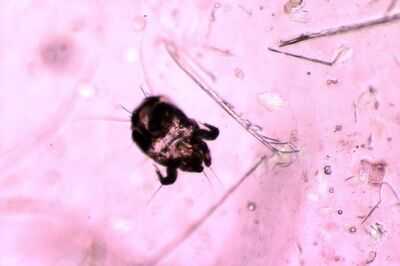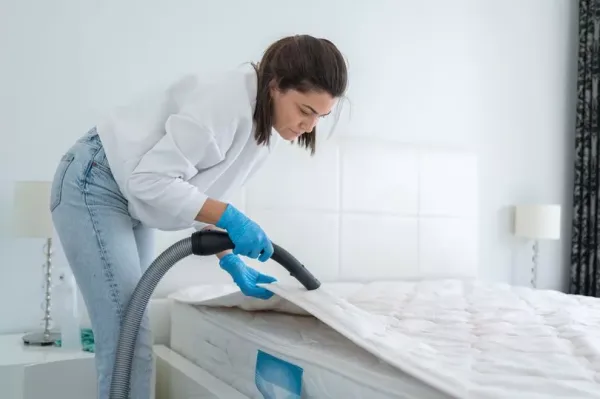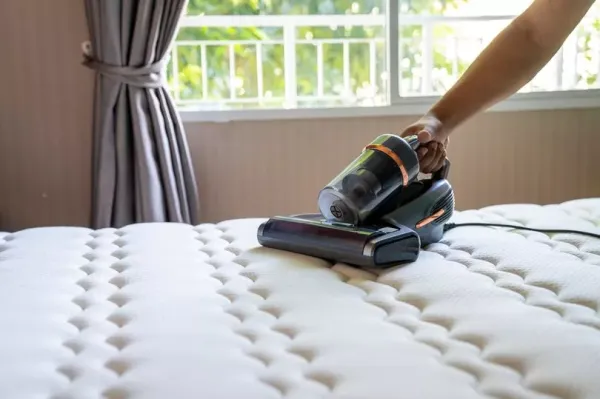
Brits spend 27 years in bed - but these are the 5 dirtiest spots in your bedroom
We spend a huge chunk of our lives in bed around 27 years sleeping and 7 more just trying to nod off. And while your bedroom might feel like a cosy retreat, experts say it could secretly be one of the dirtiest places in the home.
Martin Seeley, senior sleep expert at MattressNextDay, has revealed the five biggest hygiene hazards in the bedroom – and how to tackle them.
READ MORE: Parents can now be fined £2,500 for taking kids on holiday during term time
READ MORE: UK gardeners warned over small plant lurking in garden that 'could be toxic'
Your mattress is a dust mite havenMost of us wouldn’t dream of using the same bath towel for years without cleaning it - yet our mattresses are often neglected. “Recent studies have shown that the average mattress contains up to 10,000 dust mites,” says Martin.

“Practically invisible to the naked eye, dust mites feast on the dead skin we shed and flourish in warm, moist conditions. These dust mites can then produce more than two million droppings, which are known to aggravate allergies.
In many cases, it’s the enzymes released in dust mite droppings that cause or inflame certain allergic reactions – particularly asthma or other associated breathing problems.”
Experts recommend a deep clean every three months, especially when rotating your mattress.
Light switches and lamps are crawling with bacteriaA fifth of Brits admit they only clean light switches once a year or not at all. “Light switches are one of the first things we touch in the morning and one of the last things we touch before we go to sleep.
Despite light switches being a key part of our bedroom routines, they’re often not cleaned regularly - if at all, meaning they can harbour skin bacteria like Staphylococcus and Streptococcus and even E. coli if hand hygiene is neglected.”
Lamps and fan switches are often even more neglected, especially if the switches are hidden. Wiping them down with mild disinfectant once a week can help reduce germs and make your space feel fresher.
 Headboards are a hotspot for mould and bed bugs
Headboards are a hotspot for mould and bed bugs
Almost a third of Brits say they’ve never cleaned their headboard – despite it being inches from your face at night.
"Many of us are guilty of sitting in bed with wet hair wrapped in a towel after a shower, but what you might not realise is that this can encourage mould growth over time, particularly on fabric, upholstered or wooden headboards.
These mould spores can then worsen allergies and breathing difficulties, making it harder to get a good night’s sleep. Not only this, but headboards are a common hiding spot for bed bugs, which typically lurk in warm, soft spaces like upholstered or fabric headboards.”
Blankets and throws barely get washed. As the temperature drops, Brits reach for blankets – but forget to wash them.
Only 36 per cent of us clean blankets more than once a year, even though they absorb sweat, skin flakes and body oils just like your sheets.
"Because blankets and throws are often kept close to our faces during sleep, they can trigger allergies and breathing issues if they aren’t washed regularly, leaving you tossing and turning through the night instead of getting proper rest," says Martin.
"We recommend washing your blankets and throws once a week with the rest of your bedding to keep your sleep environment clean, comfortable and restorative." The fix is to wipe solid headboards with disinfectant and vacuum fabric ones regularly to get rid of dust, skin, oils and pests.
 Hot water bottle covers can trap bacteria
Hot water bottle covers can trap bacteria
Hot water bottles are a cosy alternative to cranking up the heating - but many of us never wash the covers, which can become damp and grimy over time.
"As the evenings get colder, hot water bottles will be making a welcome return to our bedtime routines across the nation. And while they’re refilled regularly, the fabric covers and the bacteria they can harbour are rarely given a second thought. In fact, most of us have probably never washed our hot water bottle cover."
Martin says most covers can go in the wash with your pillowcases or sheets. Use 30C and a mild detergent for fleece, fur or knitted covers to stay safe and snug this season.